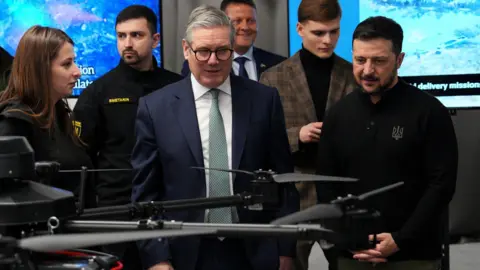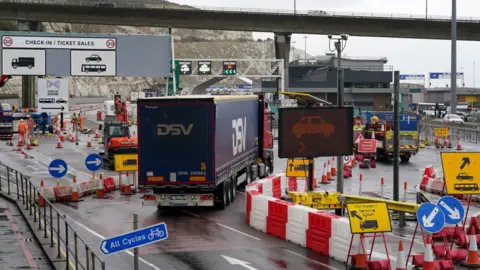In a historic move signaling a new chapter in the UK’s post-Brexit era, Prime Minister Sir Keir Starmer has arrived in Brussels for an unprecedented meeting with European Union leaders. This marks the first time a British prime minister has attended an EU summit since the United Kingdom officially left the European Union, an event that has fundamentally altered the political landscape across Europe.
Starmer’s visit is not merely ceremonial; it represents a significant diplomatic gesture aimed at “resetting” the UK’s relationship with its European neighbors. The discussions will center on vital issues such as defence, security cooperation, trade, and counteracting global challenges. The visit comes at a time when international relations are under intense scrutiny, with escalating geopolitical tensions due to Russia’s aggression in Ukraine and the evolving rhetoric of U.S. President Donald Trump. These global developments have added a sense of urgency to the UK’s need to forge new alliances and recalibrate its diplomatic ties, especially in relation to Europe.
Starmer’s presence in Brussels is seen as a necessary step in re-establishing a cooperative partnership with the European Union. While the UK government has repeatedly stated that it will not seek to rejoin the EU’s Single Market or Customs Union, nor will it allow freedom of movement, the emphasis is now on strengthening ties in areas of mutual concern. The UK’s need for closer collaboration with Europe on security matters has become paramount, particularly as the war in Ukraine shows no sign of ending. The EU’s growing recognition that it must take greater responsibility for its own defence—a key and recurring demand from President Trump—has fueled these discussions.

Speaking to the media, Prime Minister Starmer outlined the UK’s stance on Russia: “We are committed to working with our European partners to maintain pressure on Russia, targeting key sectors like energy and military supplies that fuel Putin’s war machine. Our military support, combined with strategic economic sanctions, is the pathway toward peace.”
Starmer’s comments are particularly poignant given the economic pressure on Russia, which continues to feel the impact of international sanctions. With the UK and the EU united in their objective to curb Russia’s destabilizing influence, this meeting marks a renewed commitment to a collective European security framework, even in the absence of formal UK membership within the EU.
The political dynamics at play are intricate and must be navigated carefully. The UK’s strengthened relations with the European Union have the potential to create friction with the United States, particularly under President Trump, who has made veiled threats regarding trade policies with the UK. Trump’s recent comments about the UK being “out of line” on trade and his assertion that “things can be worked out” have added an element of uncertainty to the diplomatic calculus.
The UK government faces the challenge of balancing its relationships with both the EU and the US—two of the world’s most influential political entities. While Starmer’s outreach to the EU has sparked optimism about smoother cooperation, the UK must tread carefully to avoid alienating the United States. This delicate balancing act will require the UK to navigate its trade policies and military alliances with precision.
Trade is expected to be a central theme in the discussions, with particular focus on sectors such as energy and food trade. The UK is exploring deeper cooperation with the EU, particularly around the energy sector, where the two sides may seek to align emissions trading schemes. This collaboration could significantly reduce barriers for the trade of energy resources, allowing for a more integrated European energy market.
Another area of interest is the mutual recognition of professional qualifications, which could streamline processes for workers moving between the UK and EU countries. The UK is also considering a youth mobility scheme that would allow young people from both regions to travel and work more freely. However, this proposal may meet with political resistance, as it bears some resemblance to the concept of freedom of movement, which was a key issue in the Brexit referendum.
Moreover, there is growing interest in enhancing cooperation on tackling serious and organized crime. The UK and the EU have mutual interests in combating cross-border criminal activities, and discussions are underway to address these challenges through joint law enforcement initiatives and data-sharing mechanisms.
One of the more innovative proposals on the table is the UK’s potential involvement in the Pan-Euro-Mediterranean Convention. This arrangement, while not a full customs union, could offer significant trade benefits by removing customs duties on certain components that are sourced from countries within the convention. This move would be especially beneficial for industries with complex supply chains, such as the automotive sector, where ‘just in time’ production models are commonplace.

The UK has not ruled out joining the convention, and while this would not violate its post-Brexit red lines, it could pave the way for a more fluid trade relationship with European nations. For industries like automotive manufacturing, this could reduce operational costs and streamline production. However, other sectors may face increased competition, and these concerns will likely be debated as the negotiations continue.
While Starmer’s diplomatic outreach has been widely seen as a positive step toward repairing UK-EU relations, it has not been without political controversy. Conservative figures, including Kemi Badenoch, have criticized the Labour government’s efforts, accusing them of attempting to reverse Brexit and inch the UK back into the EU fold. These criticisms reflect the deep divisions within British politics regarding the country’s future relationship with Europe.
Starmer faces a delicate political environment in the UK, with opponents on both sides of the debate. While some applaud the Prime Minister’s pragmatism in seeking closer EU ties, others see this as a betrayal of the Brexit vote, fearing it could lead to a weakening of UK sovereignty. As negotiations with the EU continue, Starmer must navigate these internal pressures while also managing the external dynamics of international diplomacy.
Following the discussions in Brussels, Starmer is expected to visit the United States in the coming weeks, where he will likely continue his diplomatic efforts to maintain strong ties with Washington while managing the evolving relationship with Europe. As the UK and the EU seek to finalize the details of their new partnership—likely culminating in a summit later this spring—the political landscape will continue to shift, and the outcomes of these negotiations will have far-reaching implications for both regions.
As the UK charts a new course in its post-Brexit future, Starmer’s actions in Brussels represent a pivotal moment in shaping the nation’s global standing. Whether this “reset” with the EU will lead to a more prosperous, cooperative future remains to be seen. What is certain is that the world will be watching closely as the UK navigates its place on the global stage.
Stay ahead with the latest news on global innovation, leadership, entrepreneurship, business, and tech. Join us on WhatsApp or Telegram for real-time updates. Have a report or article? Send it to report@theinnovationtimes.com.
Follow us on X (Twitter), Instagram, LinkedIn, Pinterest, and Facebook for more insights and trends.


